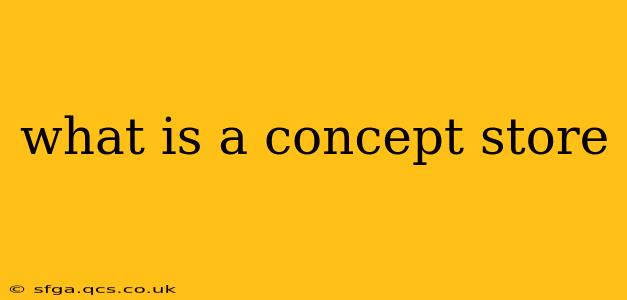Concept stores are more than just shops; they're curated experiences designed to tell a story. They blend retail, art, and lifestyle to create a unique and immersive environment for shoppers. Instead of focusing solely on selling products, concept stores build a brand narrative, showcasing a specific aesthetic, lifestyle, or idea. This makes them powerfully engaging and memorable for customers, setting them apart from traditional retail spaces.
This guide will delve into the intricacies of concept stores, exploring their defining characteristics and answering frequently asked questions surrounding this innovative retail model.
What makes a concept store different from a regular store?
The core difference lies in the intentionality and narrative. A regular store primarily focuses on selling products efficiently. A concept store, however, uses products as a storytelling tool to evoke a feeling, share a vision, or represent a specific brand identity. The environment, product selection, and overall experience are meticulously designed to align with the overarching concept. Think less about simply purchasing an item, and more about becoming immersed in a curated world.
What are some examples of concept stores?
Many well-known brands have successfully incorporated the concept store model. Consider these examples:
- Colette (formerly in Paris): A pioneering example, Colette was renowned for its carefully curated mix of fashion, beauty, technology, and art, creating a vibrant and ever-evolving retail experience.
- Dover Street Market: Known for its avant-garde fashion and art installations, Dover Street Market locations worldwide are celebrated for their unique and often disruptive aesthetic.
- The Apartment by The Line: This minimalist concept store combines fashion, home goods, and art within a carefully designed residential-style space, creating a sophisticated and intimate shopping experience.
What are the benefits of opening a concept store?
For businesses, concept stores offer several key advantages:
- Brand Differentiation: In a crowded marketplace, a strong concept helps a brand stand out and connect with a specific target audience.
- Enhanced Customer Engagement: The immersive experience creates deeper customer relationships and loyalty.
- Increased Brand Awareness: Unique and memorable concept stores generate significant buzz and media attention.
- Higher Perceived Value: The curated selection and experience often justify higher price points.
How do concept stores generate revenue?
Revenue generation is similar to traditional retail, but the emphasis is often on experience-driven sales. While product sales are a primary revenue stream, many concept stores also incorporate complementary revenue streams such as:
- Events and workshops: Hosting events related to the store's concept attracts customers and generates additional income.
- Collaborations: Partnering with other brands aligns with the store's concept and expands reach.
- Membership programs: Exclusive perks for loyal customers increase engagement and revenue.
What are the challenges of running a concept store?
Running a successful concept store comes with unique challenges:
- Higher upfront investment: Curating a unique experience requires careful planning and significant investment in design, branding, and product sourcing.
- Maintaining consistency: The store must consistently deliver on its brand promise to maintain its unique identity.
- Finding the right location: The location needs to align with the target audience and overall brand aesthetic.
How do concept stores use technology?
Technology plays an increasingly important role in enhancing the concept store experience. This can include:
- Interactive displays: Showcasing products and information in innovative and engaging ways.
- Personalized recommendations: Using data to tailor the shopping experience to individual customer preferences.
- Omnichannel integration: Seamlessly connecting the online and offline shopping experience.
Are concept stores profitable?
The profitability of a concept store depends on several factors, including the strength of the concept, the effectiveness of the marketing strategy, and the efficiency of operations. While the upfront investment can be higher, successful concept stores can generate significant revenue and build strong brand loyalty, leading to long-term profitability.
In conclusion, concept stores are a dynamic and evolving retail model that prioritizes experience, storytelling, and brand identity. By creating immersive and memorable experiences, concept stores are redefining the relationship between brands and consumers. Their continued success hinges on adaptability, innovation, and a deep understanding of the target audience.
